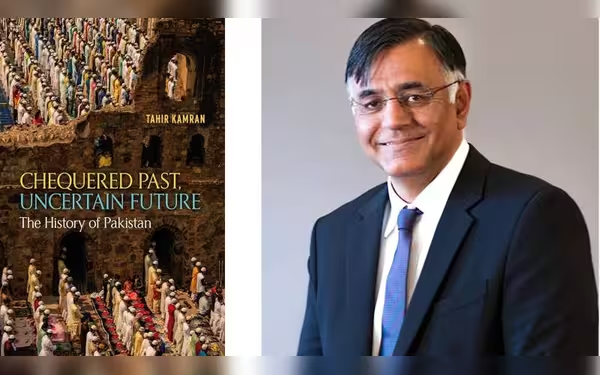Saturday, November 16, 2024 05:53 PM
Tahir Kamran's Insightful Exploration of Pakistan's History
- Kamran challenges conventional narratives of Pakistan's history.
- The book critiques key political figures and their decisions.
- It highlights the complexities of Pakistan's identity and governance.
 Image Credits: thefridaytimes
Image Credits: thefridaytimesTahir Kamran's book offers a critical examination of Pakistan's history, challenging established narratives and exploring its complex identity.
The book titled "Chequered Past, Uncertain Future: the History of Pakistan" by Tahir Kamran is a significant contribution to the understanding of Pakistan's history. It ambitiously covers the geographical area now known as Pakistan, tracing its roots from the ancient civilizations of Harappa and Mohenjo-Daro to the present day. Writing such a comprehensive history is no small feat, as it requires the author to make tough choices about what to include and what to leave out. Kamran's work stands out because it begins with a past that is often overlooked by conventional historians, particularly because it is not centered around Muslim narratives.
In the book, Kamran discusses the era of Muslim rule in India, including the Sultanates and the Mughal Empire. He argues that this rule should not be viewed solely through a religious lens, as people of various faiths, including Hindus, played significant roles in governance. This perspective challenges the notion that Muslims were outsiders in India, highlighting that many rulers intermarried and settled in the region, becoming as Indian as anyone else. However, he also draws parallels with British rule, noting that while the British employed Indians in their administration, they never truly integrated into Indian society.
The author provides a concise account of the rise of Muslim separatism and the partition of India, touching upon the tragic events of 1947, including the exchange of populations and the associated violence. Kamran appreciates the literary reference to Faiz Ahmed Faiz's poem about these events, yet he critiques the historical figures involved, such as Jinnah, Nehru, and Gandhi, for not foreseeing the chaos that would ensue from the partition.
Kamran's analysis of Jinnah's role as the first Governor-General of Pakistan is particularly noteworthy. He questions Jinnah's approach to governance, suggesting that his reliance on bureaucrats and exclusion of politicians was detrimental to the development of a democratic tradition in Pakistan. The book also addresses the contentious issue of state accession, particularly regarding Jammu and Kashmir, and acknowledges the involvement of Pashtun tribesmen in the conflict, a fact often denied by other historians.
The narrative continues through the political landscape of Pakistan, detailing the military's rise to power under Ayub Khan and the subsequent economic developments. While Ayub's policies strengthened the economy, they also led to significant disparities, particularly alienating East Pakistan, which eventually resulted in the creation of Bangladesh in 1971. Kamran's treatment of these events is balanced, although he notes that the suffering of the Bengali people could have been given more attention.
As the book progresses, it delves into the era of populism under leaders like Zulfikar Ali Bhutto and the impact of Zia-ul-Haq's regime on Pakistani society. Kamran critiques Bhutto's leadership style and acknowledges the negative consequences of Zia's policies, which curtailed rights for women and minorities. He describes Zia's rule as one that fostered intolerance, a sentiment that resonates in contemporary Pakistan.
Throughout the book, Kamran maintains a dispassionate tone, presenting historical events objectively. However, he does not shy away from expressing his views on modern political figures, particularly when discussing Asif Zardari and the Sharif family, whom he describes as lacking integrity. This critical perspective sets the stage for examining the nature of democracy in Pakistan, which he characterizes as "establishmentarian democracy," where military influence looms over elected officials.
Tahir Kamran's "Chequered Past, Uncertain Future" is a thought-provoking exploration of Pakistan's history that challenges conventional narratives. By addressing the complexities of the past and the interplay of various political forces, Kamran provides readers with a deeper understanding of the factors that have shaped Pakistan's identity. This book is not just a historical account; it is a call to reflect on the lessons of the past as Pakistan navigates its uncertain future.













